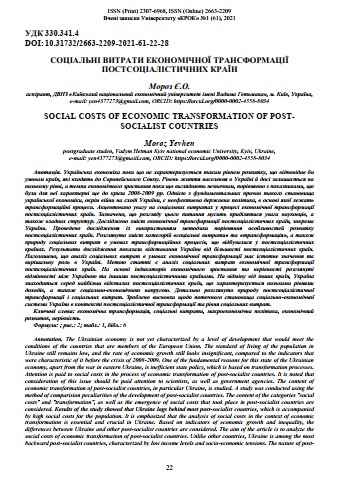SOCIAL COSTS OF ECONOMIC TRANSFORMATION OF POST-SOCIALIST COUNTRIES
DOI:
https://doi.org/10.31732/2663-2209-2021-61-22-28Keywords:
economic transformation, social cost, macroeconomic policy, economic development, inequalityAbstract
The Ukrainian economy is not yet characterized by a level of development that would meet the conditions of the countries that are members of the European Union. The standard of living of the population in Ukraine still remains low, and the rate of economic growth still looks insignificant, compared to the indicators that were characteristic of it before the crisis of 2008-2009. One of the fundamental reasons for this state of the Ukrainian economy, apart from the war in eastern Ukraine, is inefficient state policy, which is based on transformation processes. Attention is paid to social costs in the process of economic transformation of post-socialist countries. It is noted that consideration of this issue should be paid attention to scientists, as well as government agencies. The content of economic transformation of post-socialist countries, in particular Ukraine, is studied. A study was conducted using the method of comparision peculiarities of the development of post-socialist countries. The content of the categories "social costs" and "transformation", as well as the emergence of social costs that took place in post-socialist countries are considered. Кesults of the study showed that Ukraine lags behind most post-socialist countries, which is accompanied by high social costs for the population. It is emphasized that the analysis of social costs in the context of economic transformation is essential and crucial in Ukraine. Based on indicators of economic growth and inequality, the differences between Ukraine and other post-socialist countries are considered. The aim of the article is to analyze the social costs of economic transformation of post-socialist countries. Unlike other countries, Ukraine is among the most backward post-socialist countries, characterized by low income levels and socio-economic tensions. The nature of post-socialist transformation and social costs is considered in detail. Conclusions are made on the current situation of socio-economic system in Ukraine in the context of post-socialist transformation and the level of social spending.
Downloads
References
Гаврилишин Б. Д., Мочерний С. В. Економічна енциклопедія : у трьох томах. Київ: Акад. нар. госп-ва. 2002. 952 с.
Корнай Я. Социалистическая система. Политическая экономия коммунизма. Журнал Вопросы экономики. 2000. 672 с.
Kuznets S. Economic growth and income inequality. American Economic Review. 1955. P. 2-28.
Галабурда М. К. Постсоціалістична трансформація. Методологічні уроки для економічної науки: збірник матеріалів Всеукраїнського круглого столу. 2016. С. 74-76.
Slukhai S., Borshchenko T. Social welfare dynamics in post-socialist countries: unveiling the secrets of success. Institute of public finance. 2019. №2. 167-194.
World Bank, 2020. URL: https://data.worldbank.org.



